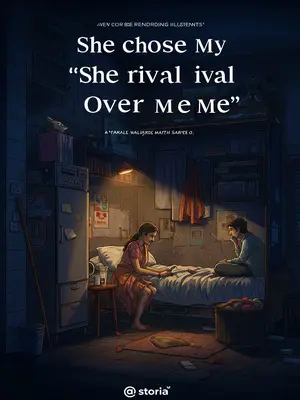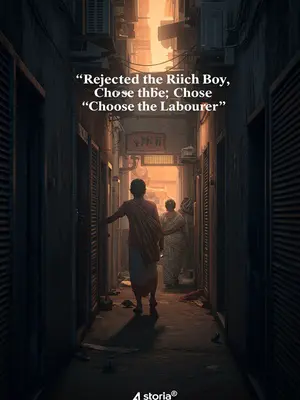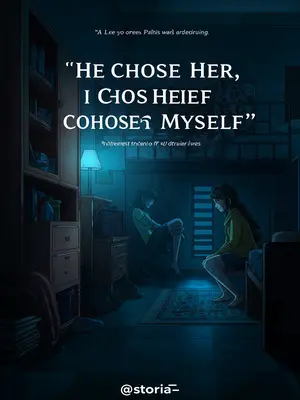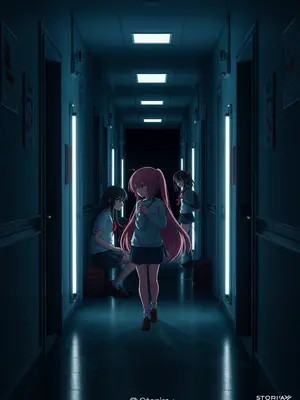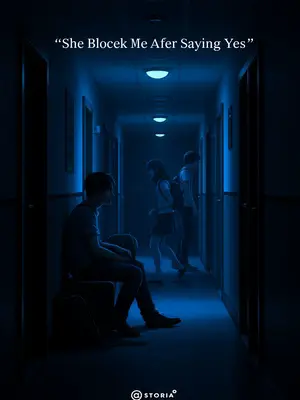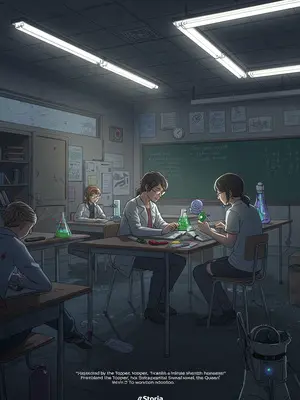Chapter 4: Rain and Ruin
Halfway there, it started to rain.
The monsoon hit with its usual fury—fat drops drumming on tin roofs, puddles forming in the lanes. My dupatta stuck to my skin, and my shoes squelched with every step. The monsoon smell—wet earth, frying pakoras from a street stall—hit me all at once. I hugged my bag close, letting the rain hide my tears.
People hurried past, all rushing to escape the downpour. Only then did I dare to cry, rain and tears streaming down together.
No one paid attention to a drenched girl sobbing under the awning of the stationery shop. It felt safe to let go, just for a moment.
When I got to school, almost everyone had left.
The corridors echoed with emptiness. The blackboard still had scribbles from the last class; the smell of chalk hung in the air. A lone peon swept the steps, glancing at me curiously.
I reached into the filthy dustbin.
I hesitated only a second, then plunged my hand inside. The stench—spoiled samosas, discarded wrappers, a hint of sanitizer—was almost overpowering.
The stench was overwhelming, but I searched again and again, desperate to find the watch I’d thrown away.
Each handful of garbage scraped my skin, but I didn’t care. I muttered prayers under my breath, bargaining with every god I could remember.
I bit my lip, wanting to slap myself for tossing it away.
My nails dug into my palm. "Stupid girl," I whispered, voice trembling. How could I have been so impulsive?
Even selling it would have brought in a few hundred rupees.
A few hundred might have helped with Ma’s medicines, at least for a day or two. Regret gnawed at me.
I searched for hours, digging through every piece of trash, but the watch was gone.
By the time I gave up, my uniform was smeared with dirt, my hands scratched. I sagged against the gate, defeated.
I walked home in a daze, hopeless.
My feet dragged through the muddy lanes. I barely noticed the cycle bell jingling, or the distant sound of a cricket match blaring from someone’s window.
By then, the street was deserted, rain pouring down, the drops stinging as they hit me.
Each step felt heavier than the last. Street dogs huddled under shop awnings, watching with sad, knowing eyes.
When I got home, my father still hadn’t returned.
The bulb above our door flickered weakly. Inside, the clock ticked on, indifferent. The kitchen smelled of old masala, but there was no warmth.
The home that was once warm now felt cold and empty.
Everything—chairs, old radio, Ma’s saree draped over the back of the sofa—looked unchanged, but the spirit had gone out of the place. I wandered from room to room, unable to settle.
I waited, and waited...
I listened for the sound of their voices, for Ma’s laughter, for Papa’s uneven footsteps on the stairs. All I heard was the rain, relentless, and the distant barking of a stray dog.
In the end, someone rushed over and told me, "Your father and mother jumped into the river."
The words came out in a gasp, half-choked with tears. For a second, I didn’t understand. Then the horror hit me—a cold, sinking dread that stole my breath.
That year, I was in my final year of school. I lost both my parents and became an orphan.
My world crumbled to dust. I stood in the doorway, numb, as the neighbours gathered, whispering, "What will become of the poor girl now?"

